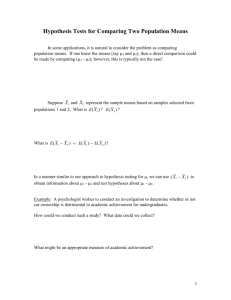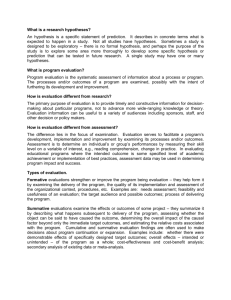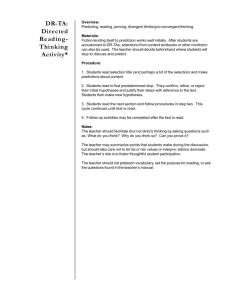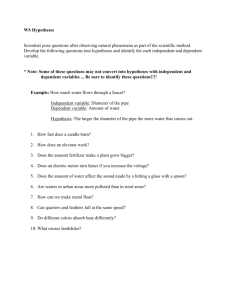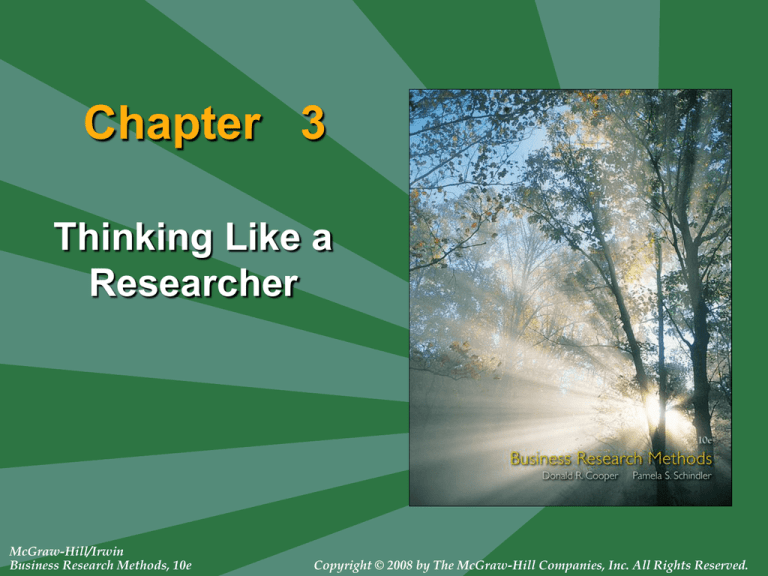
Chapter 3
Thinking Like a
Researcher
McGraw-Hill/Irwin
Business Research Methods, 10e
Copyright © 2008 by The McGraw-Hill Companies, Inc. All Rights Reserved.
3-2
Language of Research
Concepts
Constructs
Models
Terms used
in research
Theory
Conceptual
schemes
Operational
definitions
Variables
Propositions/
Hypotheses
3-3
Language of Research
Success
of
Research
Clear conceptualization
of concepts
Shared understanding
of concepts
3-4
Job Redesign Constructs and Concepts
3-5
Operational Definitions
How can we define the variable
“class level of students”?
•
•
•
•
Freshman
Sophomore
Junior
Senior
•
•
•
•
< 30 credit hours
30-50 credit hours
60-89 credit hours
> 90 credit hours
3-6
A Variable Is the Property Being Studied
Act
Event
Variable
Characteristic
Trait
Attribute
3-7
Types of Variables
Dichotomous
Male/Female
Employed/ Unemployed
Discrete
Ethnic background
Educational level
Religious affiliation
Continuous
Income
Temperature
Age
Independent and Dependent Variable
Synonyms
Independent Variable
(IV)
• Predictor
• Presumed cause
• Stimulus
• Predicted from…
• Antecedent
• Manipulated
•
•
•
•
•
•
Dependent Variable
(DV)
Criterion
Presumed effect
Response
Predicted to….
Consequence
Measured outcome
3-8
3-9
Relationships Among Variable Types
3-10
Relationships Among Variable Types
3-11
Relationships Among Variable Types
3-12
Moderating Variables (MV)
• The introduction of a four-day week (IV) will lead
to higher productivity (DV), especially among
younger workers (MV)
• The switch to commission from a salary
compensation system (IV) will lead to increased
sales (DV) per worker, especially more
experienced workers (MV).
• The loss of mining jobs (IV) leads to acceptance
of higher-risk behaviors to earn a familysupporting income (DV) – particularly among
those with a limited education (MV).
3-13
Extraneous Variables (EV)
• With new customers (EV-control), a switch
to commission from a salary compensation
system (IV) will lead to increased sales
productivity (DV) per worker, especially
among younger workers (MV).
• Among residents with less than a high
school education (EV-control), the loss of
jobs (IV) leads to high-risk behaviors (DV),
especially due to the proximity of the firing
range (MV).
3-14
Intervening Variables (IVV)
• The switch to a commission compensation
system (IV) will lead to higher sales (DV)
by increasing overall compensation (IVV).
• A promotion campaign (IV) will increase
savings activity (DV), especially when free
prizes are offered (MV), but chiefly among
smaller savers (EV-control). The results
come from enhancing the motivation to
save (IVV).
3-15
Propositions and Hypotheses
• Brand Manager Jones (case) has a
higher-than-average achievement
motivation (variable).
Generalization
• Brand managers in Company Z (cases)
have a higher-than-average achievement
motivation (variable).
3-16
Hypothesis Formats
Descriptive Hypothesis
• In Detroit, our potato
chip market share
stands at 13.7%.
• American cities are
experiencing budget
difficulties.
Research Question
• What is the market
share for our potato
chips in Detroit?
• Are American cities
experiencing budget
difficulties?
3-17
Relational Hypotheses
Correlational
Causal
• Young women (under 35)
purchase fewer units of
our product than women
who are older than 35.
• An increase in family
income leads to an
increase in the
percentage of income
saved.
• Loyalty to a grocery store
increases the probability
of purchasing that store’s
private brand products.
• The number of suits sold
varies directly with the
level of the business
cycle.
3-18
The Role of Hypotheses
Guide the direction of the study
Identify relevant facts
Suggest most appropriate research
design
Provide framework for organizing
resulting conclusions
3-19
Characteristics of Strong Hypotheses
Adequate
A
Strong
Hypothesis
Is
Testable
Better
than rivals
3-20
The Role of Reasoning
3-21
The Scientific Method
Direct observation
Clearly defined variables
Clearly defined methods
Empirically testable
Elimination of alternatives
Statistical justification
Self-correcting process
3-22
Researchers
•
•
•
•
•
Encounter problems
State problems
Propose hypotheses
Deduce outcomes
Formulate rival
hypotheses
• Devise and conduct
empirical tests
• Draw conclusions
3-23
Sound Reasoning
Types of Discourse
Exposition
Deduction
Argument
Induction
3-24
Why Didn’t Sales Increase?
3-25
Tracy’s Performance



